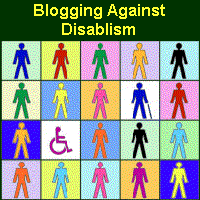Blogging For Inclusion

Today I join more than 100 other bloggers in blogging against disablism. The intent is, by joining together in discussing discrimination still facing people with disabilities, we will bring the issue to the forefront yet again.
What is disablism? A pamphlet by Demos, the British think tank for everyday democracy, offers this definition:
Disablism n. discriminatory, oppressive or abusive behaviour arising from the belief that disabled people are inferior to others.
(although you won’t find a definition in a dictionary)
Disablism is the British equivalent of the American term ableism used to describe discrimination against people with disabilities in favour of people who are not disabled. Ableism discriminates, devalues and denigrates the same as does racism and sexism. Ableism treats those without disabilities as the standard of “normal’, against which everyone is measured.
Being a woman who has lived with cerebral palsy for forty years, I could share countless stories about how I have been discriminated against and treated “less than” by doctors, bus drivers, potential employers, and strangers. Discrimination, whether direct or indirect, is the main reason I chose the self-employment route. It’s not because I didn’t want the steady paycheque, the pension plan, or the friendly banter around the water cooler; it is because employers couldn’t get beyond their heebee-geebees about my disability during the interview process.
One interview was at an inaccessible building (another form of discrimination), yet the employer blatantly refused to meet with me at a more accessible location. If he had determined I was the most suitable candidate and had offered me the job, Vocational Rehabilitation Services could have then stepped to assist in making the workplace accessible. By refusing to interview me, he did not permit me the opportunity to demonstrate my capabilities, skills and talents. I eased my hurt by convincing myself that he missed out on hiring the most meticulous and creative Newsletter Coordinator he ever would have had. But, in reality, the experience did (and still does) sting.
I could go on and on about ways I have experienced discrimination and disablism (or ableism, depending upon which side of the pond you are on); but, really, where would that get us? What good is rehashing negative experiences? And, according to the Law of Attraction, focusing on negativity will only bring more – that is something I can definitely do without! Rather than being against disablism, I’d rather be for inclusion. By focusing on what I want, rather than what I don’t, the Law of Attraction works in my favour.
Being self-employed and working mainly in the virtual world, I can choose when and how much to disclose to clients. Many clients do not know the extent of my cerebral palsy; those who do know do not see it as a factor as long as I can do the work. We focus on the task at hand and my talents, expertise and passions are fully utilized; such a liberating feeling!
If my disability doesn’t matter much online, how can we make disabilities less of a deal when face-to-face? How can we achieve an inclusive society? I’d love to hear your ideas. Let’s talk.
If you enjoyed this post, consider buying me a chai tea latte. Thanks kindly.
 Subscribe via RSS
Subscribe via RSS



